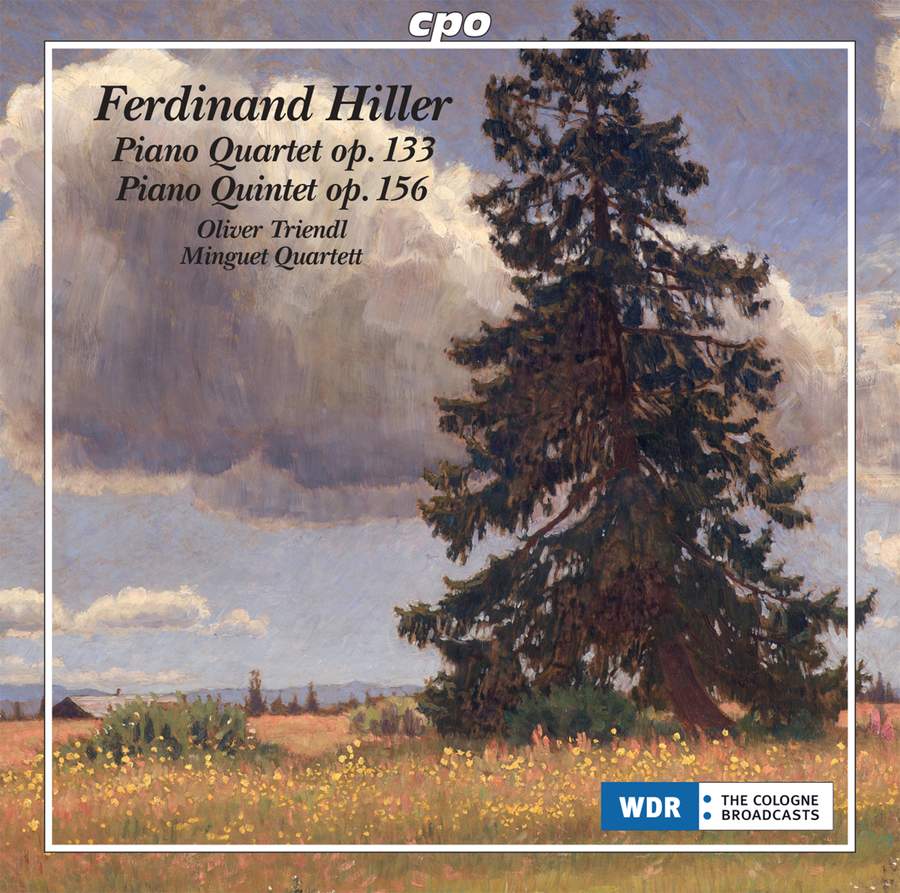HILLER Piano Quartet No 3. Piano Quintet Op 156
View record and artist detailsRecord and Artist Details
Genre:
Chamber
Label: CPO
Magazine Review Date: 08/2022
Media Format: CD or Download
Media Runtime: 77
Mastering:
DDD
Catalogue Number: CPO555 312-2

Tracks:
| Composition | Artist Credit |
|---|---|
| Piano Quartet No 3 |
Ferdinand Hiller, Composer
Minguet Quartet Oliver Triendl, Piano |
| Piano Quintet |
Ferdinand Hiller, Composer
Minguet Quartet Oliver Triendl, Piano |
Author: David Threasher
Ferdinand Hiller (1811 85) is one of those composers known more as a name in the biographies of others than for his own music. Initially moving among progressive circles alongside the likes of Chopin, Liszt and Berlioz, he appears to have spent his career preceding or succeeding men such as Schumann and Mendelssohn in their various posts across the middle of Germany. He later came to be seen as a conservative figure and his music appears to have been forgotten almost as soon as he was no longer there to promote it. The substantial booklet essay is headed ‘A plea for a forgotten composer’, as well it might be, and the ever-curious Oliver Triendl and the Minguet Quartet make just about the best possible case for two of his crowning chamber works.
Brahms is the most obvious comparison, in terms not only of chronology but of the forces and scale of these two works. Hiller must, like his younger colleague, have been a formidable pianist but he also knew how to write for strings and to balance the notoriously tricky combinations of piano with string trio and quartet. The Third (and final) Piano Quartet (c1868), in A minor, is a work of passionate Romanticism, while the G major Quintet (1873) is more lyrical, though not without its own ardent outbursts. Both works are built from strong ideas, deployed with immaculate technique and a clear sense of structure – for all that one may feel, in the finale of the quartet, for instance, that Hiller runs through his motifs just once too often in an attempt to eke out the final couple of pages.
So why have the equivalent works of Brahms remained in the repertoire instead of these by Hiller? What’s missing here, perhaps, is the last ounce of melodic individuality or quirky harmony that tweaks the ear and keeps the listener coming back to Brahms’s chamber music. That’s no reason to disregard these ambitious and finely realised works, though. And it’s hard to imagine them being played much better than this, by players who are audibly wholly invested in the rehabilitation of this fascinating second-rank composer.
Discover the world's largest classical music catalogue with Presto Music.

Gramophone Digital Club
- Digital Edition
- Digital Archive
- Reviews Database
- Full website access
From £8.75 / month
Subscribe
Gramophone Full Club
- Print Edition
- Digital Edition
- Digital Archive
- Reviews Database
- Full website access
From £11.00 / month
Subscribe
If you are a library, university or other organisation that would be interested in an institutional subscription to Gramophone please click here for further information.




